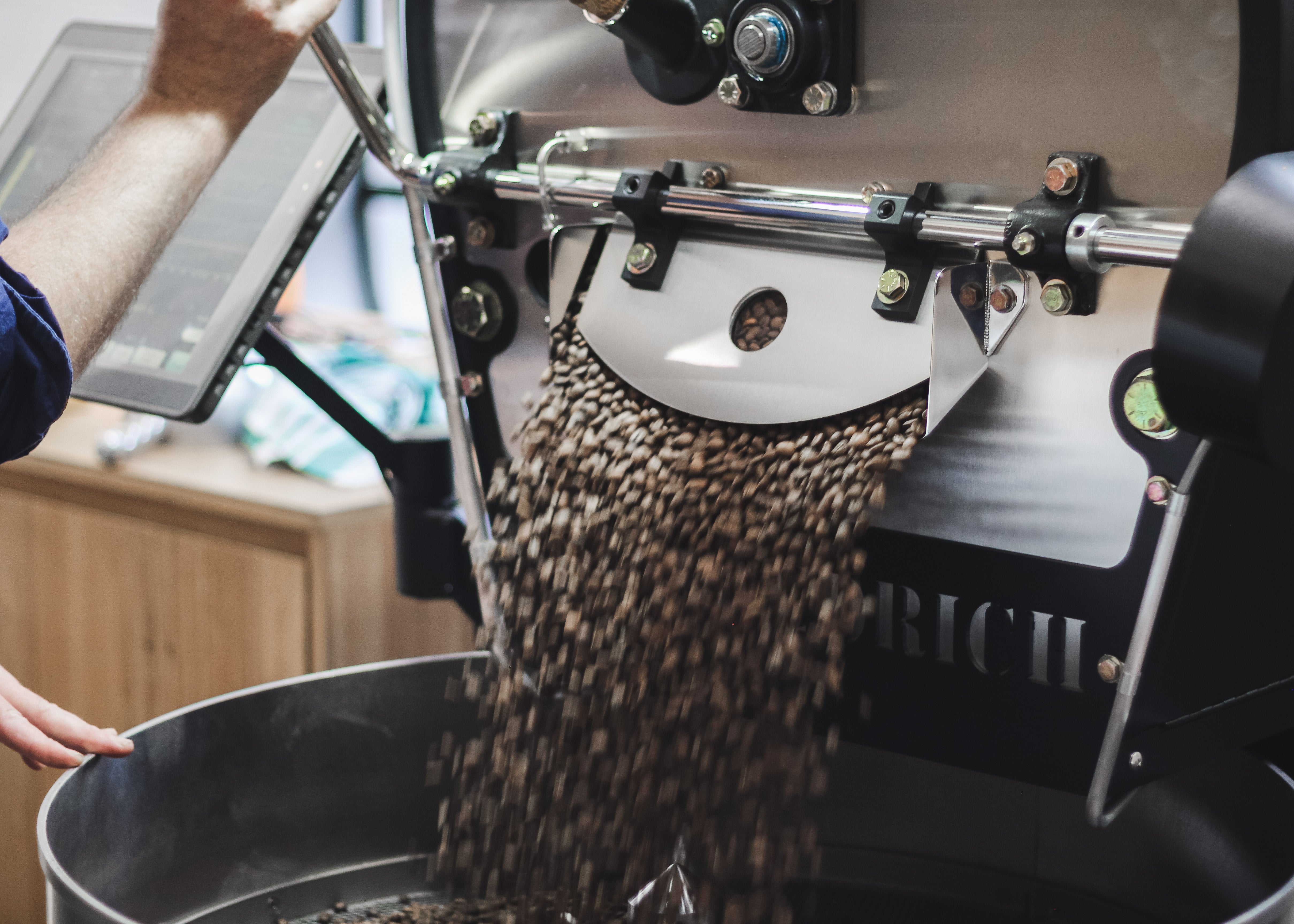Are you the type of coffee aficionado to buy coffee in bulk so you'll never have to run out of your favourite coffee beans? You might have to rethink that because the coffee beans in your stash can actually go stale and worse, even go bad. Here's a guide on how long coffee beans last, and what you can do to make them stay fresher for longer.
How to Tell If Coffee Beans Are Bad?
The most obvious way to tell if your roasted coffee beans are bad is through its appearance. If the colour of your once dark and rich-looking coffee beans has changed into a dull brown, then it's probably time to throw them away. You'll also notice that the once-plump beans have now shrivelled up.
If you want to be absolutely sure, then give it a smell. If your coffee beans smell sour or rancid, then it's definitely time to get rid of them.
What Causes Roasted Coffee Beans To Go Bad?
The three main causes of roasted coffee beans going bad are moisture, oxygen, and light.
If the roast is exposed to too much moisture, the coffee will start to mould and develop a sour taste. If the roast is exposed to too much oxygen, it will start to go stale and lose its flavour. And if the roast is exposed to too much light, it will start to deteriorate and become bitter.
All of these factors can be either avoided or minimized by storing roasted coffee beans in an airtight container in a dark place.
How long do whole coffee beans last?
If you have whole coffee beans, they will have maximum freshness for about three weeks. After that, the flavours will start to dull and the beans will go bad.
You can extend the shelf life of your coffee by storing it in an airtight container in a cool, dry place. The freezer is actually a good place to store coffee beans because the temperature is low enough to prevent oxidation.
How long do pre-ground coffee beans last?
Pre-ground coffee beans will usually last for about two weeks, although flavour and aroma may diminish sooner.
One of the main reasons pre-ground coffee beans lose their flavour so quickly is because they're exposed to more oxygen than whole coffee beans. Oxygen can cause the oils in the coffee beans to degrade, which results in a loss of flavour.
That's why it's best to grind your own coffee beans just before you brew them. If you don't have time to grind your own beans, try to buy them from a store that has a relatively quick turnover rate.
Factors that impact coffee freshness

The factors that impact coffee freshness are numerous and complex. To begin with, coffee beans are a perishable product, and as such, are subject to degradation over time. The rate at which this degradation occurs though depends on a number of factors:
Type of Coffee Bean
The type of coffee bean will impact how long your coffee beans stay fresh. Arabica beans will generally stay fresh for longer than Robusta beans because they are less dense and they have a higher pH balance.
Coffee Storage
The way you store your coffee beans will also affect their shelf life. If you store them in a cool, dry place in an airtight container, they will stay fresher for longer. However, if you store them in a warm, humid place like on your kitchen counter or near a window they will go bad more quickly.
Roasting Method
The roasting method used when making your coffee beans will also impact how long they stay fresh. For example, if you use a pan roaster, the heat will accelerate the breakdown of the oils in the beans, resulting in a shorter shelf life. On the other hand, if you use a drum roaster, the heat won't damage the oil content of the beans, allowing them to stay fresher for longer periods of time. The roast profile of your coffee beans will also affect how long they stay fresh. Lightly roasted beans will generally stay fresh for longer than darkly roasted beans because they have less oil on their surface.
Grind Size
The grind size of your coffee beans will also affect their shelf life. Finely ground coffee will go bad more quickly than coarsely ground coffee because there is more surface area exposed to oxygen.
Exposure to Air, Light, and Moisture
Coffee beans that are exposed to air, light, and moisture will go bad more quickly than coffee beans that are not exposed to these elements. If you want your coffee beans to stay fresh for longer, make sure to store them in airtight mason jars or vacuum-sealed coffee container
Time
Coffee beans will go bad over time, regardless of how they are stored. The longer you keep your coffee beans, the more likely they are to go bad. But with proper storage, you can extend your coffee beans' shelf life and get a quality cup of coffee each time.
The Science Behind Coffee Beans Freshness
In order to understand why coffee freshness is so important, it's important to first understand the coffee roasting process. Coffee beans are actually seeds from a fruit, and roasting them brings out the flavour by heating the bean and causing chemical changes in the oils. The longer a coffee bean is roasted, the more oils are released and the more intense the flavour becomes. However, those same oils also begin to degrade over time and upon exposure to oxygen and moisture in the air, eventually leading to a flat or burnt taste.
This is why it's so important to buy fresh coffee beans - the fresher they are, the longer they'll retain their optimally flavorful oils. So, next time you're looking for the best cup of joe, be sure to choose beans that have been roasted within the last week or two.
The Art of Keeping Coffee Fresh

When it comes to coffee, freshness is key. You want your beans to be as fresh as possible so that you can enjoy the full flavour and aroma that your coffee has to offer. But how can you make sure that you're using fresh coffee beans every time?
How To Tell If Your Coffee Beans are Fresh
There are a few things you can look for to ensure that you are using fresh beans for your morning or afternoon coffee.
Smell
The first thing you should do is smell your beans. Fresh coffee beans should smell lightly caramelized and almost nutty. Stale coffee beans will smell musty and cardboard-like, and if they smell sour or rancid already, then it's time to get rid of them.
Visuals
The next thing you can do is look at your beans. Fresh coffee beans should be deep brown in colour and have a shine to them. If your beans are dull in colour or have shrunk in size, then they are no longer fresh.
Texture
The last thing you should do is feel your beans. Fresh coffee beans should be firm to the touch and have a slight give when you compress them. If your beans are hard or brittle, then they're no longer good.
Taste
The fourth thing you should do is grind a few beans and brew a small cup of coffee. If the coffee tastes sour or bitter, then the beans are probably bad. Coffee made from newly-roasted beans should have a fresh taste and a balance between the flavours of sweetness, bitterness, and acidity, with a smooth flavour, and absolutely no off-notes.
If you want to be absolutely sure that your beans are fresh, then it's best to buy them from a reputable source so you can be sure that your beans are as fresh as they can be when you take them home.
Why is Coffee Bean Storage Important?

The storage conditions of your coffee beans are important because it affects the freshness of your coffee beans. The fresher your beans are, the better your coffee will taste. Coffee beans are a sensitive product and must be handled with care. The most important factor in keeping coffee beans fresh is to keep them away from moisture, light, and air.
When coffee beans are exposed to oxygen, they start to go stale and the flavour begins to change.
How to Store Coffee Beans?
The best way to store coffee beans is in an airtight container in a cool, dark place. You can also store your coffee beans in the freezer if you plan on using them within a month or two. If you're going to be storing your beans for longer than that, it's best to buy them whole and grind them as you need them. It's important to transfer right away after opening their original packaging because you wouldn't want your coffee beans to be in contact with air for too long.
What Is The Best Container To Store Coffee?
The best container to store coffee beans is an airtight canister that is made of a material that is not transparent to light. Glass, ceramic, and metal are all good materials for storage containers. However, coffee beans should not be stored in plastic containers. Plastic is porous and allows oxygen to enter the container. This causes the beans to oxidize and turn stale quickly.
Read More: How to store coffee beans to keep your beans fresh
More Questions on Coffee Beans Freshness Answered
How long can roasted coffee beans last in an unopened store-bought bag?
If stored properly, roasted coffee in an unopened store-bought bag can last up to two weeks. Once you open the bag, roasted coffee beans will start to go stale within a week tops.
Can I freeze my coffee beans?
Yes, you can freeze your coffee beans. Just make sure to store them in an air-tight container so they don't absorb any moisture or odours from your freezer. Make sure to remove the coffee from the original packaging and make small portions in plastic zipper bags to fend off freezer burn. Frozen coffee beans will last up to six months.
Read our full guide: A Guide to Freezing Coffee Beans
What happens if I drink coffee from stale or expired coffee beans?
If you use stale coffee beans, your coffee will taste flat and bitter. The coffee will also have less caffeine because the beans will have lost some of their potency over time.
What can I do with coffee beans that have gone bad?
You can do a few things with coffee beans that have gone bad. You could, for example, use them as compost in your garden. You can also use them as a natural deodorizer. Just put them in an open container and place them in the fridge or freezer to absorb odours. You can also use them to make coffee body scrubs that have a lot of antioxidants that your skin will thank you for.
More Tips to Extend your Coffee Beans' Shelf Life
So you wouldn't have to deal with stale beans, try out these tips:
Keep them out of direct sunlight
Coffee beans start to lose their flavour the longer they are exposed to sunlight. The light breaks down the oils in the beans, which is what gives them their flavour. So it's important to keep them in a dark place where they can't be exposed to light. For optimum freshness, store your coffee beans in a cool, dark place like your cupboard or pantry.
Try to buy coffee beans in smaller batches
When you buy coffee beans in small batches, you're getting beans that are fresher and have a higher flavour profile. Coffee beans start to lose their flavour profile almost immediately after they're roasted, so the sooner you can get them into your cup, the better. Plus, it's just more fun to experiment with different types of coffee when you're not stuck with a huge bag of one type of bean!
Don't grind them until you're ready to use them
Grinding coffee beans fresh immediately before brewing is important because it releases the oils and aromas of the coffee bean. Once ground, the coffee beans start to oxidize, and the flavour starts to deteriorate.
Freshly ground coffee also produces a more flavorful cup of coffee since it's brewed with smaller particles that release more flavour compounds. Conversely, pre-ground coffee is usually made with larger particles that don't produce as much flavour.
How to Buy the Freshest Coffee Beans
It's a no-brainer that in order to make the best cup of coffee at home, you should have the freshest beans on hand. Having good beans is half the battle won, so here’s what you should be looking out for:
Ditch the supermarket
The coffee beans in the coffee aisles are probably not going to be very fresh. They may have been sitting on the shelf for weeks or even months. It's better to buy your beans from specialty coffee roasters where they're more likely to be fresh. Buying coffee beans from a local roaster is not only better tasting but also good for your community. Coffee farmers often sell their products directly to cafes and small-scale breweries, so you’re helping them improve both quality of life as well as generate more revenue by supporting this business model where everyone involved has an opportunity at success.
Check the roast date
When you're buying beans, make sure to check the roast date and not the best-by-date. The roast date is when the coffee beans were roasted, not when they were packaged.
The freshest coffee beans will have a roast date that is within the last week or two. If you can't find the roast date, it's best to assume that the beans are at least a few weeks old.
Buy Whole Beans
If you want the freshest coffee possible, you should buy whole beans and grind them yourself. Pre-ground coffee starts to go stale almost immediately after it's ground. Whole beans, on the other hand, can last for weeks if stored properly. Plus, grinding your own beans gives you more control over the grind size, which can impact the flavour of your coffee.
Always buy from a reputable source
A good rule of thumb is to buy from a source that you can trust. Choose a local specialty coffee roaster or coffee shop that is transparent with where they source their coffee beans and how they prepare and roast them before packaging. This way, you can be confident that you're getting fresh, high-quality coffee beans every time.
The Bottom Line
As any coffee lover knows, freshness is key to a great cup of coffee. Coffee beans begin to lose their flavour and aroma as soon as they are roasted, so it is important to buy from a reputable source that gives meticulous care and attention in providing you with fresh coffee beans every time you need a restock. Veneziano Coffee Roasters is dedicated to providing the freshest coffee beans possible. We source our beans from all over the world, and we roast them in small batches to ensure that they are always fresh. Our team of experienced roasters carefully monitor the roasting process to ensure that each batch is roasted to perfection. With Veneziano's specialty coffee beans you can have barista-quality coffee in the comfort of your own home.



